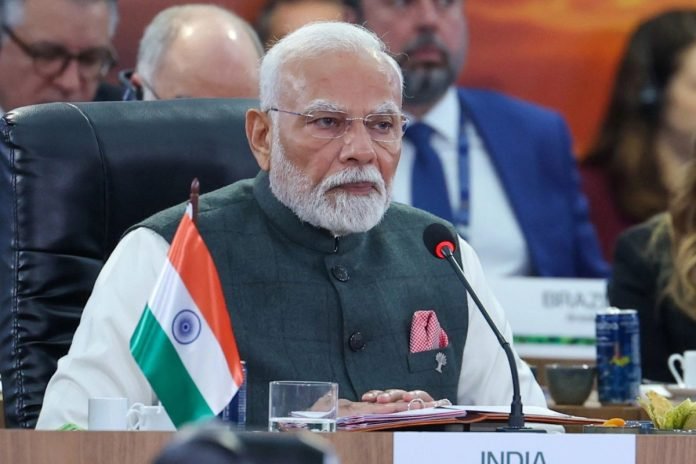New Delhi: Prime Minister Narendra Modi has announced that under India’s presidency of BRICS in 2026, the forum will adopt a distinctly people-centric approach, guided by the principle of “humanity first.”
In his address at the 17th BRICS Summit in Rio de Janeiro, PM Modi emphasised India’s commitment to redefining BRICS as “Building Resilience and Innovation for Cooperation and Sustainability.”
He highlighted that, just as India prioritised inclusivity and the concerns of the Global South during its G20 Presidency, it will similarly advance BRICS with a focus on people and collective well-being.
PM Modi praised Brazil’s leadership in prioritising the environment and health security during its BRICS chairmanship, noting that these issues are deeply interconnected and crucial for humanity’s future. With COP-30 being hosted in Brazil, discussions on environmental protection are especially timely.
Modi reiterated India’s traditional reverence for nature and the country’s ongoing transformation in mindset and lifestyle to balance life with environmental stewardship.
India’s proactive environmental and developmental initiatives were spotlighted, including:
- Mission LiFE (Lifestyle for Environment): Promoting sustainable living.
- Ek Ped Maa Ke Naam: Encouraging tree planting in honour of Mother Earth.
- International Solar Alliance: Advancing solar energy adoption.
- Coalition for Disaster Resilient Infrastructure: Strengthening infrastructure against climate risks.
- Green Hydrogen Mission and Global Biofuels Alliance: Accelerating clean energy transitions.
- Big Cats Alliance: Focusing on wildlife conservation.
- These initiatives underscore India’s commitment to the “People, Planet, and Progress” triad.
PM Modi recalled India’s achievements during its G20 Presidency, particularly the consensus on the Green Development Pact and the launch of the Green Credits Initiative to incentivise environment-friendly actions. He noted that India is the first major economy to achieve its Paris Agreement commitments ahead of schedule and is making rapid strides toward its Net Zero target by 2070.
Over the past decade, India has seen a remarkable 4000% increase in installed solar energy capacity, laying the groundwork for a sustainable future.
India views climate justice as a moral imperative and stresses the need for technology transfer and affordable financing for developing countries. Modi called on developed nations to bridge the gap between climate ambition and financing, emphasising that sustainable development cannot be achieved while double standards persist.
He welcomed the release of the “Framework Declaration on Climate Finance” as a step toward equitable climate action.
Recognising the intertwined nature of planetary and human health, PM Modi highlighted the lessons of the COVID-19 pandemic and the importance of collective action. He pointed to the BRICS Vaccine R&D Centre, launched in 2022, as a milestone in health cooperation. India’s “One Earth, One Health” mantra has driven expanded international collaboration, and the Ayushman Bharat health insurance scheme now serves over 500 million people. Additionally, India has fostered an ecosystem for traditional medicine and expanded digital health services to rural and remote populations.
The 17th BRICS Summit, held under Brazil’s chairmanship, brought together leaders from Brazil, Russia, India, China, South Africa, and new members Egypt, Ethiopia, Iran, the UAE, and Indonesia.
Discussions covered a wide array of issues, including:
- Reform of global governance structures
- Amplifying the voice of the Global South
- Promoting peace and security
- Strengthening multilateralism
- Addressing development challenges
- Harnessing the potential of Artificial Intelligence
As India prepares to assume the BRICS presidency in 2026, it is poised to steer the forum with a renewed emphasis on inclusivity, sustainability, and collective progress. By championing a people-centric approach and the spirit of “humanity first,” India aims to ensure that BRICS remains a dynamic platform for addressing the pressing challenges of the 21st century, from climate change and health security to equitable development and global cooperation.






